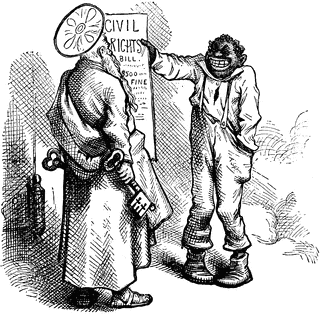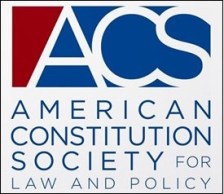This week marks the 135th anniversary of the U.S. Supreme Court’s opinion in The Civil Rights Cases, 109 U.S. 3 (1883). While to some this is a mere historical footnote, the decision is worth remembering because it reflects the tensions at play today concerning how constitutional law can, through unrelenting formalism and a preference towards denying the salience of race, contributes to enduring structural oppression. The reasoning in The Civil Rights Cases is an object study in how to maintain white supremacy—and a mirror to our society today.
The opinion overturned the Civil Rights Act of 1875. It sought to protect recently freed African-American slaves from discrimination in the use of “inns, public conveyances on land or water, theaters, and other places of public amusement.” In striking down this nineteenth-century public accommodations law, thus allowing private businesses to deny services to African Americans because of their race, Justice Joseph P. Bradley, speaking for the 8-1 Supreme Court majority, made three arguments.
 First, the Court held that the power to regulate individuals and corporations fell to the states, not the federal government. Second, to the extent Congress passed the Act under its Fourteenth Amendment authority, the Court held that the Fourteenth Amendment was limited to regulating actions by states and not private actors (a doctrine that still holds today). Finally, the Court interpreted the Thirteenth Amendment, meant to remedy the badges and incidents of slavery, as only allowing Congress to abolish denials of legal rights extending from past slavery.
First, the Court held that the power to regulate individuals and corporations fell to the states, not the federal government. Second, to the extent Congress passed the Act under its Fourteenth Amendment authority, the Court held that the Fourteenth Amendment was limited to regulating actions by states and not private actors (a doctrine that still holds today). Finally, the Court interpreted the Thirteenth Amendment, meant to remedy the badges and incidents of slavery, as only allowing Congress to abolish denials of legal rights extending from past slavery.
The Court’s underlying rationale is truly telling: accommodation of ex-slaves in present commerce is irrelevant to past slavery and the Thirteenth Amendment. African Americans complaining of such discrimination should seek state remedies or federal remedies to the extent Congress wishes to make them. This may be true as far as it goes, and by this time we already knew that the ex-Confederate states and their agents had not been aggressive in pursuing remedies for discrimination—the reason for the 1875 law. And we also know that after this act was struck down, Congress passed no other civil rights legislation for over eighty years.
Indeed, the Court denies the possibility that racism may be tied to the caste system that slavery created. Bradley claimed that to treat discrimination in public accommodations as related to bias arising from slavery is to take “the slavery argument” too far:
It would be running the slavery argument into the ground to make it apply to every act of discrimination which a person may see fit to make as to the guests he will entertain, or as to the people he will take into his coach or cab or car, or admit to his concert or theater, or deal within in other matters of intercourse or business.
This is the kind of slippery-slope argumentation that willingly denies the past of slavery and the (obvious) interconnections between white racism, racial caste, and its more immediate outcomes.
This was done despite the dissent of Justice John Marshall Harlan, who warned that without the intervention of Congress and a more fulsome interpretation of the Reconstruction Amendments, African American citizens will not be able to “take the rank of citizen” rather than subordinated class. One hundred thirty-five years later, and it is this same battle that we fight today. As Harlan put it—and it is worth reading his argument in detail:
The difficulty has been to compel a recognition of their [African American’s] legal right to take that rank [of citizen], and to secure the enjoyment of privileges belonging, under the law, to them as a component part of the people for whose welfare and happiness government is ordained. At every step in this direction the nation has been confronted with class tyranny, which a contemporary English historian says is, of all tyrannies, the most intolerable, ‘for it is ubiquitous in its operation, and weighs, perhaps, most heavily on those whose obscurity or distance would withdraw them from the notice of a single despot.’ Today it is the colored race which is denied, by corporations and individuals wielding public authority, rights fundamental in their freedom and citizenship. At some future time it may be some other race that will fall under the ban. If the constitutional amendments be enforced [as Harlan believed they were meant to be enforced—to end racial discrimination in civil rights based on race or previous servitude] . . . there cannot be, in this republic, any class of human beings in practical subjection to another class, with power in the later to dole out to the former just such privileges as they may choose to grant.
In other words, this class tyranny betrays the values of the Constitution by interfering with the goal of Reconstruction – equality of all citizens. Class tyranny in 1883 was the weapon of those who sought to oppress on the basis of race. Class tyranny intersects with racial tyranny and can target multiple groups over time. Such class tyranny in the service of white supremacy is itself antidemocratic and against the vision of the reconstructed Constitution. And the decision narrowing the power of the national government to stand against such tyranny under the guise of narrow formalism will allow such tyranny to flourish and reinvent itself.
What of these themes do we see in 2018?
We have seen the Roberts Court deny the possibility that the larger harms of voter suppression may be tied to the historical motivations and past racially discriminatory practices of state governments. In Shelby County v. Holder, the Court relies on the claim that “the South has changed” to justify nullifying Congress’s judgment that Section 5 of the Voting Rights Act ought to be used to continue to supervise the recalcitrant ex-Confederate states in their voting practices.
We see the Court once again relying on manufactured formalism to justify hard lines between state authority and federal authority to supervise voting, immigration, education, and other racial (as well as gendered, class-based, and sexual preference-based) fault lines; and states have taken this opportunity to institute disenfranchising and discriminating practices in this space. We have seen commentators, legislatures, and judges argue that talking about race in and of itself is divisive, and that aspirations towards post-racialism should silence debate around race despite the racist actions that daily remind us about its enduring salience and power.
This post-racialism argument is the modern-day version of the “running the slavery argument into the ground.” The holders of these views (on the right and on the left) decontextualize discrimination, rely on admitted intent rather than see discriminatory actions in and through context, and rest comfortably within deep denial about how subornationist structures still dominate our society.
We can see these things in The Civil Rights Cases. It is a mirror to our 2018 society. This opinion reflects the structures and habits of mind bent towards continued white supremacy today.
(Cross-published at Race Law Prof Blog.)



 TEDxOshkosh performance: Using Memes to Break Out of Voter Fraud Talk
TEDxOshkosh performance: Using Memes to Break Out of Voter Fraud Talk

 forward to reflecting on the open, online
forward to reflecting on the open, online